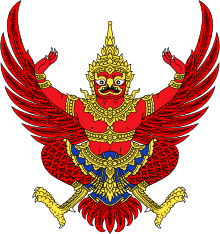Thai nationality law
| Thai Citizenship Act | |
|---|---|
 | |
| Parliament of Thailand | |
| An Act relating to Thai citizenship | |
| Enacted by | Government of Thailand |
| Status: Current legislation | |
Thai nationality law includes principles of both jus sanguinis and jus soli. Thailand's first Nationality Act was passed in 1913. The most recent law dates to 2008.
Jus sanguinis
Persons born anywhere in the world to at least one parent with Thai citizenship themselves are entitled to Thai citizenship at birth. [1]
Jus soli

The first Thai Nationality Act of 1913 and most subsequent acts have included the principle of jus soli, though at times with various restrictions.[2] The 1952 Nationality Act rescinded the 1913 act's provisions for jus soli, in response to concerns over the integration of the children of Chinese immigrants, but unlimited jus soli was restored just four years later by the 1956 Nationality Act.[3] In 1972, due to illegal immigration from Burma and concerns over communist insurgency in border areas, the Nationality Act was amended to require that both parents be legally resident and domiciled in Thailand for at least five years in order for their child to be granted Thai citizenship at birth, and revoked citizenship from many people who had it under the earlier act.[4][5] This caused difficulties for members of hill tribes in border areas who were not registered in the 1956 census, since they had no way to prove that their parents were Thai as opposed to having entered the country as refugees.[6][7]
Article 23 of the 2008 Nationality Act reversed the 1972 act, restoring citizenship to those who had it before, and allowing people born in Thailand before 1992 to apply for Thai citizenship anew. However, applicants have reported various difficulties in getting government officials to process their applications. Following the act's passage, one of the first people to gain citizenship under Article 23 was Fongchan Suksaneh, a child of American missionaries to the Mlabri people who was born in Chiang Mai Province.[6][8] Children, neither of whose parents are citizens and at least one of whose parents is an illegal alien, remain not entitled to jus soli citizenship.[1] Furthermore, someone who has Thai citizenship by sole virtue of jus soli may still lose Thai citizenship under various conditions of the 2008 act (such as living abroad) which do not apply to people who have Thai citizenship by virtue of jus sanguinis.[9] In 2013, the Ministry of Interior proposed new immigration regulations, based on Section 7 of the 2008 Nationality Act, to declare children who did not gain Thai citizenship at birth as illegal immigrants and have them deported.[10]
Naturalisation
The strictness of Thailand's requirements for naturalisation have varied over the years, beginning with fairly loose restrictions, which were tightened in the mid-20th century before being loosened again.[11] The Nationality Act of 1939 tightened the requirements, stipulating that applicants for naturalisation had to abandon their foreign names and take Thai names, as well as send their children to Thai schools; these rules were part of a broader trend of laws designed to promote the assimilation of the Thai Chinese community.[12] From 1935 to 1958, a total of 4,652 Chinese naturalised as Thai citizens. More than half of the naturalisations occurred in 1943 alone, during the Japanese occupation of Thailand, apparently driven by the desire to escape wartime restrictions on foreigners.[11]
Under the 1992 Nationality Act, naturalisation as a Thai citizen requires five years of residence in Thailand, as well as proof of a certain minimum income and renunciation of one's previous citizenship. The period of residence is reduced to three years for foreign women married to Thai men.[13] In 2003, 48 people applied for naturalisation, of whom ten were approved.[14]
Under Section 99 of the 2007 Constitution of Thailand, a naturalised citizen does not gain the right to vote until five years after naturalisation; under Sections 101, 115, 174, and 205, naturalised citizens have no right at all to stand for election to the House of Representatives or the Senate, or to be appointed as a minister or a justice of the Constitutional Court.[15]
Statelessness
As of 2016 there were 443,862 stateless people in Thailand who were born in Thailand and live there. Mostly they are from hill tribes or are the children of illegal migrants, most of them from Myanmar. Stateless people in Thailand suffer serious disadvantages. Unlike Thai citizens, they cannot use government facilities where they must first show an ID card. They cannot go to a clinic or hospital for treatment of illness or injury. They cannot open a bank account. They cannot buy and use a smartphone, or own and drive a car, or buy property or a home. Some progress is being made, but "...these efforts are halfhearted and plagued with bureaucratic hurdles" according to the Bangkok Post. It gives as an example a new law, passed in 2008, that grants Thai citizenship to stateless people. But it applies only to those who were born before 26 February 1992, thus impacting the young most harshly. The good news is that stateless children can now attend state schools. Also, a new law allows stateless people to seek employment in professions not explicitly reserved for Thais. State hospitals now issue birth certificates to all children, a formality often neglected in the past. Importantly, the Thai military government has adopted the goal of "zero statelessness" by 2024.[16]
Notes
- 1 2 "To Acquire a Thai Nationality" (PDF). Canberra, Australia: Royal Thai Embassy. Retrieved 2013-01-23.
- ↑ Loos 2006, p. 134
- ↑ Suryadinata 1997, p. 251
- ↑ Yang 2009
- ↑ "Thailand". Republic of the Philippines: Office of the Solicitor General. Retrieved 2012-06-22.
- 1 2 "Reaching out to the people languishing in nowhere land". Bangkok Post. 2012-06-10. Retrieved 2012-09-21.
- ↑ Hobbes, Necia (2009-01-31). "Thailand: Legal Obstacles to Citizenship for Indigenous Groups". Jurist Legal News and Research International Edition. Retrieved 2013-01-23.
- ↑ Napaumporn 2011
- ↑ "Amendments to the Nationality Act 2008". Government Gazette of Thailand. 125. 2008-02-27. Retrieved 2012-06-22.
- ↑ "Ministry cops flak over push to deport kids". Bangkok Post. 2013-01-18. Retrieved 2013-01-23.
- 1 2 Suryadinata 1997, p. 252
- ↑ Chansiri 2008, p. 71
- ↑ Suphachaiwat, Suraphan (2003-10-30). "Thai nationality for foreign women". Phuket Gazette. Retrieved 2018-09-29.
- ↑ Khanthawong, Somdej (2004-10-28). "Thai citizenship procedure". Phuket Gazette. Retrieved 2018-09-29.
- ↑ "Constitution of the Kingdom of Thailand (Unofficial Translation)". Asian Legal Information Institute. 2007. Retrieved 2013-01-23.
- ↑ "Plight of the stateless" (Editorial). Bangkok Post. 7 December 2016. Retrieved 7 December 2016.
References
- Chansiri, Disaphol (2008). The Chinese Émigrés of Thailand in the Twentieth Century. Cambria Press. ISBN 9781934043745.
- Loos, Tamara Lynn (2006). Subject Siam: Family, Law, And Colonial Modernity in Thailand. Cornell University Press. ISBN 9780801443930.
- Napaumporn, Bongkot (February 2011). "Experience in Solving Statelessness and Nationalitylessness in Thailand: Identification, Prevention, Reduction and Protection". International Symposium on Human Rights and Support for the Stateless People around the World: Japan’s Role. Osaka, Japan: National Museum of Ethnology. Retrieved 2013-01-23.
- Suryadinata, Leo (1997). Ethnic Chinese as Southeast Asians. Institute of Southeast Asian Studies. ISBN 9789813055506.
- Yang, Bryant Yuan-Fu (2009). "Life and Death Away from the Golden Land: The Plight of Burmese Migrant Workers in Thailand". Thailand Law Journal. 12 (1). Retrieved 2013-01-23.
- ""Nationality Act, B.E. 2508" (PDF). Royal Government Gazette Vol. 129, Chapter 28. refworld.org. March 21, 2012.
Further reading
- Saisoonthorn, Phunthip Kanchanachittra (2006). "Development of Concepts on Nationality and the Efforts to Reduce Statelessness in Thailand" (PDF). Refugee Survey Quarterly. 25 (3). Retrieved 2013-01-23.
- "English Summary of Constitutional Court Ruling No. 15/2551". Constitutional Court of Thailand. 2008-10-22. Retrieved 2013-01-23.
External links
- Full Text of the Nationality Act No. 4, B.E. 2551 (2008 AD), translation by Bongkot Napaumporn of the United Nations High Commission for Refugees